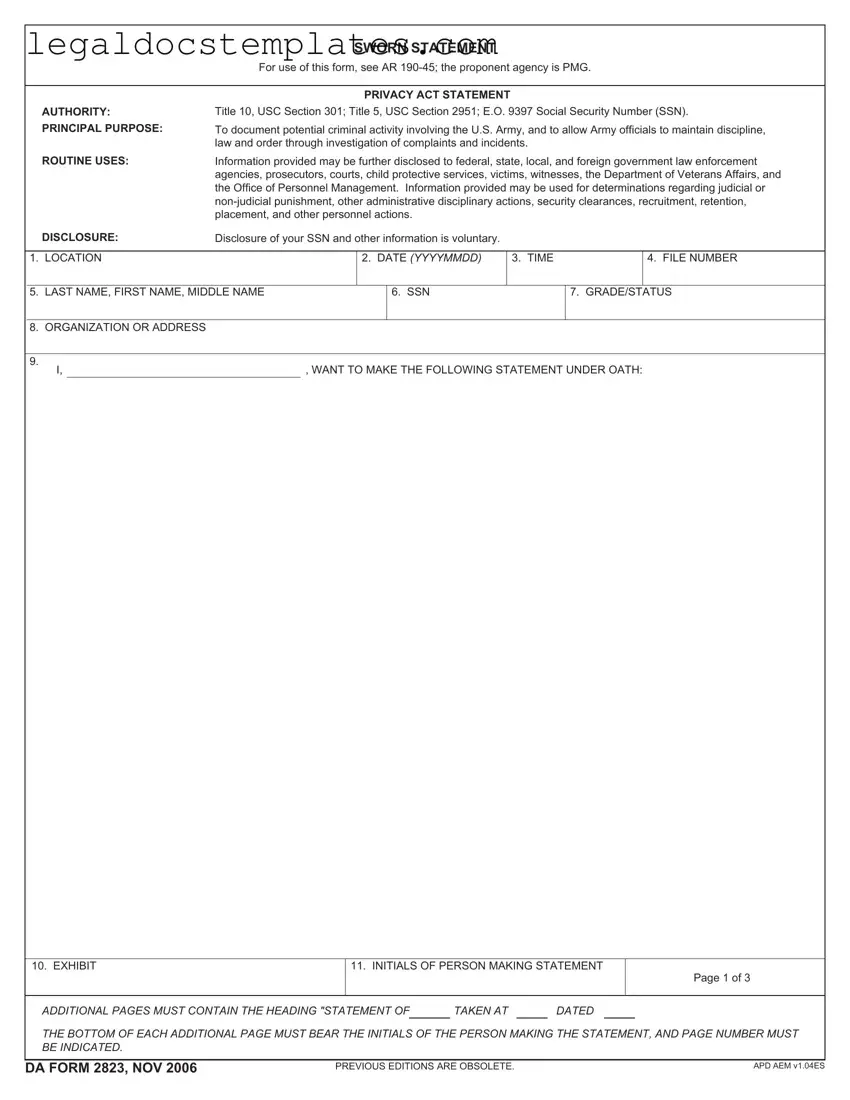The DA Form 2823, used for making sworn statements related to potential criminal activity within the U.S. Army, has similarities with various other documents used in legal and administrative processes. One such document is the Affidavit, a written statement made under oath, used across different legal settings. Both require the signer to swear to the truthfulness of the statement’s contents before an authorized official, making these documents critical for investigations and legal proceedings.
Mirroring the DA Form 2823, the Miranda Warning card is used by law enforcement before questioning a suspect in custody, ensuring the suspect is aware of their rights. Although used in different contexts, both documents serve to protect individuals’ rights and ensure the integrity of statements collected during investigations. The Miranda Warning emphasizes the right against self-incrimination, while DA Form 2823 documents statements that could be used in administrative actions or legal proceedings.
Similar to DA Form 2823, the Police Report is an official document filed by officers following an incident or crime, capturing details about what occurred. Both forms are used to record factual information and observations tied to incidents, but while DA Form 2823 focuses on sworn statements, police reports offer a broader narrative from the responding officer's perspective.
The Consent to Search form, another document similar to DA Form 2823, is used by law enforcement to obtain permission to conduct a search without a warrant. Both documents involve voluntary cooperation from the individual, whether giving a sworn statement or consenting to a search, and both contain voluntary disclosures of information critical for legal and investigatory purposes.
The Victim Impact Statement, used in the sentencing phase of a criminal trial, allows victims to describe the impact of the crime on their lives. Like DA Form 2823, it provides personal insight into the consequences of criminal activity, but from the victim’s perspective, influencing potential sentencing or disciplinary actions.
Just as with the DA Form 2823, the Military Orders document contains critical information for official actions, albeit in a different context. Military Orders detail assignments, relocations, or other directives issued to military personnel, requiring accuracy and formality in documenting actionable instructions, similar to the sworn statement's role in documenting investigatory findings.
An Incident Report, used in various organizations, records details about accidents or incidents within a facility. Like DA Form 2823, it serves an essential function in documenting factual information immediately following an event, which can be crucial for further review or action, emphasizing the importance of accurate and timely reporting in operational and legal contexts.
The Standard Form 95 (SF-95), a claim form for damage, injury, or death, shares a procedural similarity with DA Form 2823. Both forms are used within federal processes, SF-95 for claims against the government and DA Form 2823 for documenting statements within the Army. Each requires detailed, accurate information for their respective processes, whether pursuing a claim or detailing potential criminal activity.
FBI Background Check forms, requested for various reasons, require individuals to provide personal information and consent to a background review. Similar to DA Form 2823, these checks can involve the disclosure of personal information for official purposes, albeit for assessing an individual’s background rather than documenting a sworn statement related to criminal activity or misconduct.




